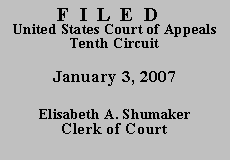

| CLIFFORD CORMIER,
Plaintiff-Appellant, v. CITY OF TOPEKA, KANSAS; COUNTY OF SHAWNEE, KANSAS, The Board of County Commissioners of the County of Shawnee, Kansas; STATE OF KANSAS, Defendants-Appellees. |
|
The district court appropriately relied on the "well-pleaded complaint" rule to evaluate federal jurisdiction. It is apparent that Mr. Cormier's issues actually concern the laws and regulations of the State of Kansas, the County of Shawnee, and the City of Topeka, not federal laws or regulations. In his complaint, Mr. Cormier did cite to certain federal provisions that generally touch upon unfair practices related to the liquor business, including parts of Title 27 of the Code of Federal Regulations. However, the district court correctly concluded that Mr. Cormier did not plead any facts that would place his alleged dispute within the ambit of those provisions. Thus, there is no federal question jurisdiction under 28 U.S.C. § 1331.(1) See Empire Healthchoice Assurance, Inc. v. McVeigh, 126 S. Ct. 2121, 2131, 2132-33 (2006) ("A case 'aris[es] under' federal law within the meaning of § 1331 . . . if 'a well-pleaded complaint establishes either that federal law creates the cause of action or that the plaintiff's right to relief necessarily depends on resolution of a substantial question of federal law.'") (quoting Franchise Tax Bd. of Cal. v. Construction Laborers Vacation Trust for Southern Cal., 463 U.S. 1, 27-28 (1983)).
On appeal, Mr. Cormier also alleges the defendants have violated his constitutional right to equal protection of the laws. Because he did not plead any equal protection claim before the district court, however, he has waived the opportunity to raise such a claim in this court. "[T]o preserve the integrity of the appellate structure, we should not be considered a 'second-shot' forum, a forum where secondary, back-up theories may be mounted for the first time." Tele-Communications, Inc. v. Comm'r, 104 F.3d 1229, 1233 (10th Cir. 1997).
The judgment of the district court is AFFIRMED.
Entered for the Court
Circuit Judge
*. After examining the briefs and appellate record, this panel has determined unanimously that oral argument would not materially assist the determination of this appeal. See Fed. R. App. P. 34(a)(2); 10th Cir. R. 34.1(G). The case is therefore ordered submitted without oral argument. This order and judgment is not binding precedent, except under the doctrines of law of the case, res judicata, and collateral estoppel. It may be cited, however, for its persuasive value consistent with Fed. R. App. P. 32.1 and 10th Cir. R. 32.1.
1. The district court properly focused its jurisdictional analysis primarily on the federal question issue under 28 U.S.C. § 1331. Mr. Cormier admitted in his complaint that he is a citizen of Kansas; as the district court correctly noted, this negated a requisite basis for diversity jurisdiction under 28 U.S.C. § 1332.